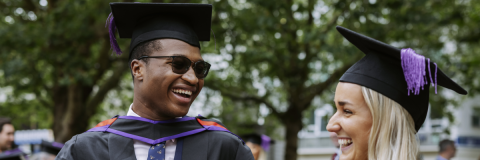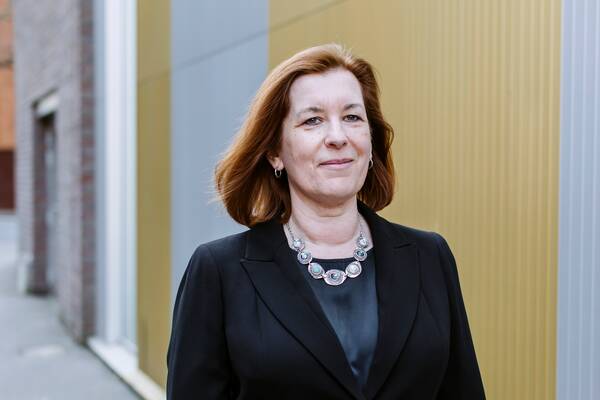
This blog from Anne Murphy explores the background to the Awarding Gap, and key next steps to fixing it.
This blog is the first in a series about the Awarding Gap, and there will be regular updates on our programme of work to deliver change.
Should you have any questions about this other topics, you can submit them to our all-staff Q&A this Thursday, 1 February, or meet with a Senior UEB member at the February Café Conversation.

Anne Murphy, Deputy Vice-Chancellor (Education)
Awarding gaps show the difference between the degree awards made to various different groups of students. At Portsmouth we measure difference by gender, ethnicity and disability. And we have a responsibility to our students to ensure that unexplained gaps are eliminated.
Currently, our largest and most persistent gaps are those that exist between students of different ethnicities. In particular, we see gaps between students from a Black background and those from a White background, with the former being awarded significantly fewer good degrees than the latter.
During the EQuIP (Excellence and Quality Improvement Plan) process this year, all Faculties identified the need for us to do more to improve outcomes for students from minoritised ethnic backgrounds and especially those students of Black heritage. This is why we are asking everyone to come together and be part of a programme to deliver change and tackle the awarding gap.
While we need to do more at the University to understand why awarding gaps exist, we can also derive insight from work done elsewhere. This research points to a number of factors but these might be summed up in findings from a collaborative project, supported by Alterline, an insight agency specialising in Higher Education:
The basic fact of being a Black minority in a white space, being taught by white tutors and surrounded by white peers has the capacity to reduce the academic performance of Black students, because of the unconscious expectations based on societal stereotypes, their internalisation by Black students and the way these play out in the learning environment.
The conclusion is clear. The Higher Education environment, some of our expectations, the difficulties of confronting and addressing societal stereotypes and the difficulties of changing our learning and teaching environments creates systemic disadvantage.
I acknowledge that it is difficult for many of us to read and to accept. But it is a reality we must confront and we must work for positive change.
The question of how to change presents an equally challenging picture. There are no easy ways to address the awarding gaps and no consensus in the sector about what works. And that is our experience too. Each of our faculties and schools is trying different ways of addressing awarding gaps and each is at a different stage of the process. It is crucial that we acknowledge and continue the good work that is already underway but we also need to push ourselves further.
We know that data is really important in understanding this problem and that we don’t always have detailed data to hand.
However, we must also acknowledge that we cannot wait to take action until all the data is available to us. We must act based on our best understanding of the problem and informed by findings from research undertaken elsewhere in the sector.
Our project, therefore, embraces some findings that are clear:
- Senior leaders must ‘own’ the problem and lead on the solutions;
- In many institutions there are one or two people pushing new ways to address the problem. TASO (Transforming Access and Outcomes in Higher Education) is clear that this presents a risk. We must, therefore, all accept responsibility for addressing awarding gaps;
- Knowledge and understanding about gaps helps. It is part of a process of naming and recognising a problem and acknowledging that change is necessary;
- Conversations help. They are part of a process of ensuring that the gaps stay at the forefront of our minds and that they are taken into consideration when we are making decisions.
The actions and activities we undertake are intended to bring about a change of culture in our institution. And we also need to encourage change in ourselves.
It is sometimes difficult for us to recognise where our practice is not optimal. We all experience this and share the discomfort of being experts in our scholarly and professional fields but not always having expertise in all aspects of our role.
All colleagues also share the discomfort of having so many conflicting calls on our time and the worry about adding challenging problems to the lists we all despair of ever getting to the end of.
And we all worry about how to navigate the challenges presented by understanding the lived experience of others and not knowing how to respond and react in a way that is accepting and sensitive but also expresses our own desire to know more about what we can do.
There are no easy solutions to these challenges either. But we must make time to inform ourselves and to better understand. We must accept a lack of comfort that might ultimately help us to bring about positive change and improve outcomes for all.
We must also accept that change of this nature is not the result of a one-off training session or an adjustment that might be made to our curricula or the way we interact with a particular individual. It is instead a practice: something that we should consider every day and something we might expect to work on every day knowing that we won’t always get it right but we will try, and reflect, and change.
Anne Murphy
Deputy Vice-Chancellor (Education)